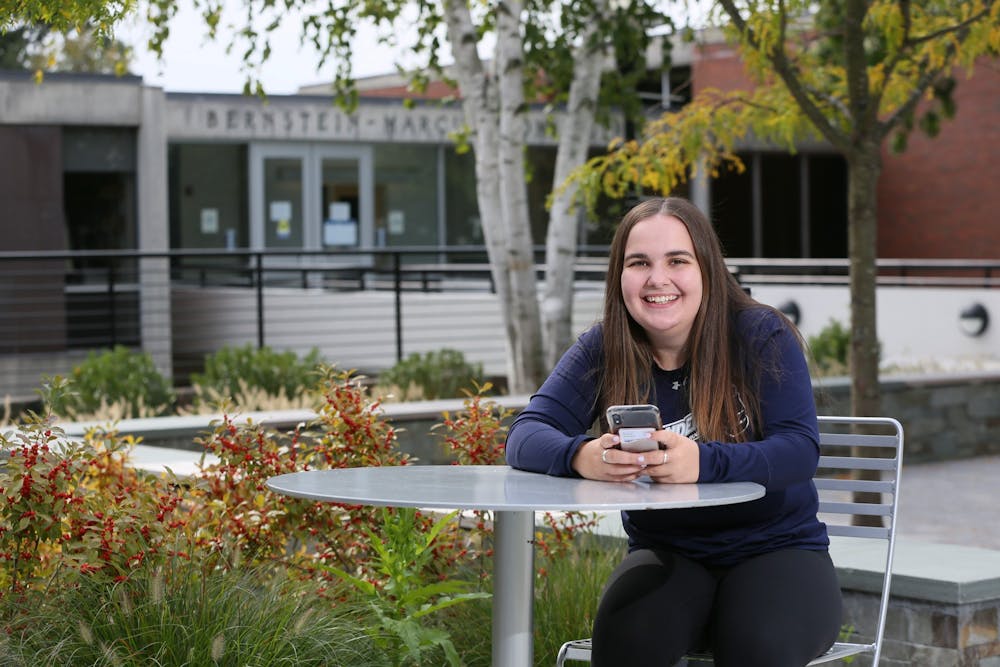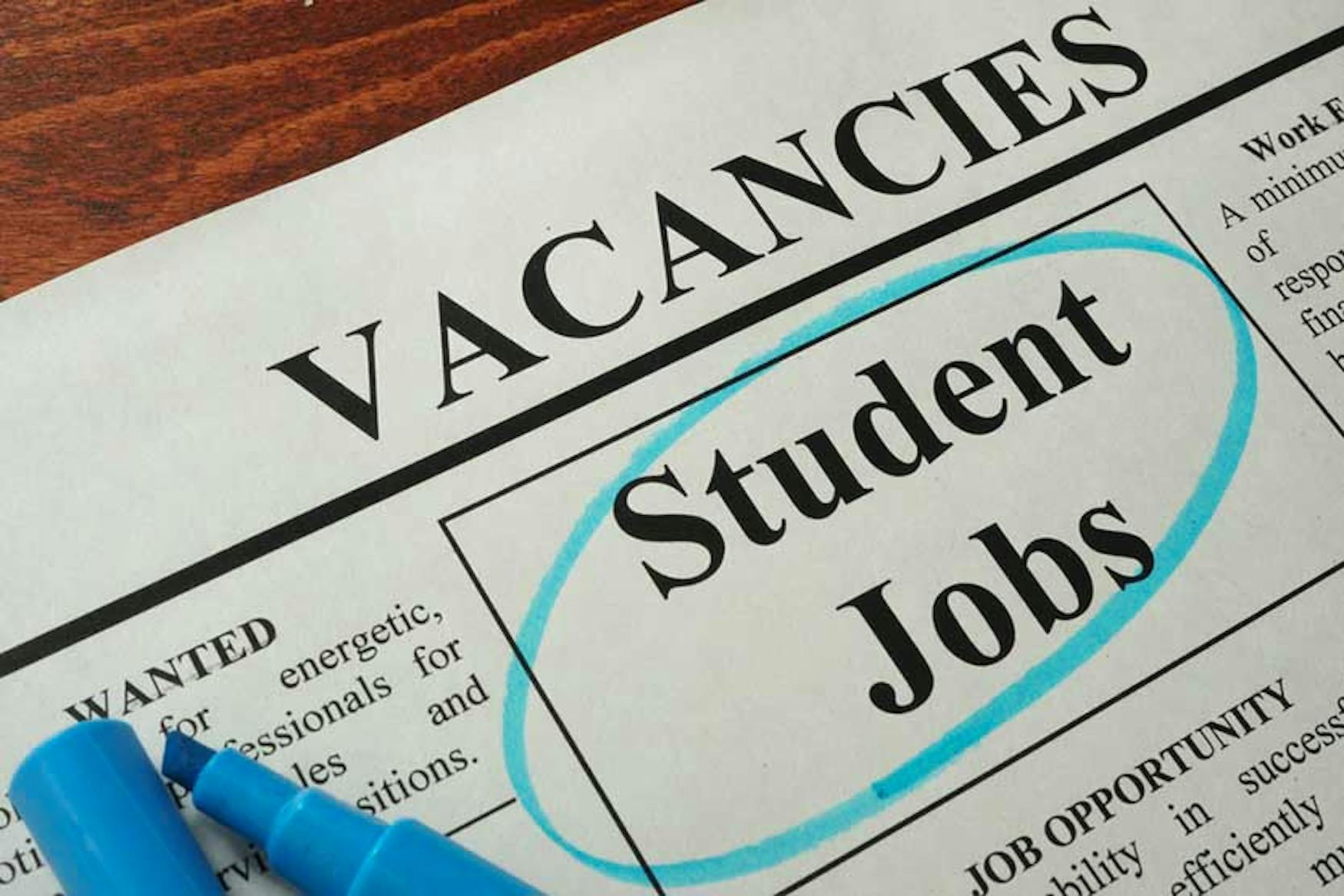Work-Study, but no work?
The Justice spoke to students on both sides of the application and hiring process for on-campus jobs to find out more about the challenges that students who have Work-Study encounter when attempting to utilize the program and get jobs on campus.
When she first arrived on campus after the break, Assia Hamana ’25 hoped to have employment in the new year. However, to her surprise, most employers had fulfilled their quota. “Everyone else was getting jobs and it felt like I was getting left behind,” she told the Justice on Feb. 11. Hamana explained that in high school, she wasn’t planning on working in college. She wanted to enjoy her time, especially as a first-year, exploring her interests in various activities. It was not until her senior year of high school that she learned about Work-Study.
Hamana is one of the more than 560,000 students in the U.S. who are granted Federal Work-Study awards in their financial aid package as a way to pay for education or the expenses that are not covered by scholarships. “It wasn’t until I learned more about Work-Study that I realized that working was probably going to be inevitable,” Hamana said.
So what exactly is Work-Study? According to the Federal Student Aid, Work-Study is a federally-funded program with the goal of helping students who have financial needs afford college with income earned through part-time jobs on campus. Students who demonstrate a certain level of financial need based on their information in FAFSA are considered for Work-Study.
The FAQ section on the Brandeis Student Employment website explains another benefit of Work-Study for those who qualify: “It is important to note that wages earned through [Federal Work-Study] will not be included in total income when determining financial aid eligibility for the following year. However, wages earned by all other employees will be included.” However, as many students discover once they arrive at Brandeis, just because one qualifies for student Work-Study does not mean they are guaranteed an on-campus job.
Hamana explained that by the time she started college, it seemed as if she could not afford not to work. She began her relentless search on Workday. Scrolling through teaching assistant positions, tutoring jobs, research opportunities, and the jobs that did not fit her schedule, she would put in her application and wait. “The application process was not even the difficult part,” Hamana said. She explained that all the jobs she did find would eventually respond and tell her that the positions were all full. “The sad part for me was that I could not even be considered for the position. I have never even had an interview for any of the jobs I have applied for.”
Rubaiya Nasim ’23 experienced a similar struggle when she tried to get a campus job to redeem the Work-Study award that was included in her financial aid package. In a message to the Justice through Instagram on Feb. 12, she wrote, “Work-Study jobs are somehow way more competitive than I thought they would be. Sometimes you’d receive a letter rejecting you, but at times some departments didn't even send a notice.” Nasim also had trouble finding a job that fit her well.
She explained that as an underclassman without proper qualifications for many of the jobs available at Brandeis, employment options on campus were limited. “You definitely can't be a TA or research assistant right off the bat, so that leaves mainly office jobs or jobs that require you to be more outgoing, like tour guides or student callers, which I think puts some students at a disadvantage if they don't have the personality for it.”
During her first-year and sophomore years, finding work was a struggle for Nasim. Now, in her junior year, she has finally been able to reap the benefits of Work-Study, “I somehow was fortunate enough to get two jobs this semester.”
Nasim and Hamana’s struggle to get hired for a Work-Study job raises the question, does Work-Study truly help offset the financial burden of a college education for the students who have financial need, if Nasim, Hamana, and students like them are not able to get a job until as late as their junior year?
According to the Brandeis Student Employment policies, the process of searching for and applying to jobs on campus is almost entirely the same for students who have Work-Study and for those who do not. The only difference is that students with Work-Study and University employment are given the chance to apply for jobs at Brandeis during the first month of the semester, while students who do not have Work-Study have to wait until October to apply to on-campus jobs. This means that until Oct. 1 of any given school year, students with Work-Study can apply to as many jobs as needed without competing with applicants without Work-Study.
This system is designed so that students with Work-Study have a greater chance of finding a job; however, the experiences of the students the Justice interviewed illustrated that even when only competing with other students who have Work-Study, there is by no means a guarantee that these students will find employment.
According to the Brandeis Student Employment FAQ page, “While some departments can hire only students who have Federal Work-Study, [there are] many others that are able to hire students who do not have FWS.” When it comes to the jobs at Brandeis that can hire students with or without Work-Study, whether an applicant has Work-Study is not always considered during the hiring process, meaning that those with Work-Study do not necessarily have a significant advantage over those without, other than the opportunity to apply a month early.
Diana Epstein ’22 is a supervisor for Brandeis Phonathon, one of the University’s fundraising programs. During a Feb. 12 Zoom interview, she spoke about the process of hiring students as shift supervisors for Brandeis Phonathon. “I don’t think Work-Study applies really at all within the interview process. It’s not really something I consider when thinking about who to hire,” said Epstein, explaining that she focuses on why applicants want the job and what qualities they can bring to the position.

Diana Epstein ’22, a training supervisor for Brandeis’ Phonathon fundraising program, sits outside of the Phonathon office.
She said that Phonathon’s hiring process is unique: “Most jobs don’t have a student interviewing and in charge of hiring ... maybe they look at whether or not people have Work-Study; in all honesty, they probably don’t. It’s not something that is really taken into account.”
“Work-Study is not only helping me with finances but also helping me pursue what I really want to do with my summers,” she said. Epstein spends her summers as a camp counselor, a job that she loves but doesn’t make her much money. This is something she says wouldn’t be possible without her on-campus jobs: “I work during the school year to pay the expenses so I can do what I love during the summer.”
Epstein explained that she was fortunate that she did not depend on needing an on-campus job.
“My parents were like, ‘You need to find a job eventually … but it does not need to be tomorrow.’ So I had the liberty of being more selective of where I wanted to apply that I am aware not everyone has,” she said, adding, “There can be quite a lot of stress and pressure [from] this idea that you are not just a student but you also must be making a certain amount of income to cover your costs.”
Epstein said that she doesn’t think she would have applied for Phonathon if she didn’t have Work-Study: “Because I had that opportunity to apply, it was one of those jobs that I found and I was like ‘Okay let's try it out.’ But it has really honestly shaped my life as to where I am today.”
She spoke about how Work-Study jobs can help students explore their interests and discover new ones. “Work-Study helps students not only in the present but also helps you explore things for the future.” In fact, Epstein’s own on-campus job led her down the career path that she is currently pursuing. “Working at Phonathon, the sales experience and non-profit development leadership that you get here is amazing. That is something that I am actually heading into now [and] after college, and that is not something that I would have been exposed to or thought about without the experience from Phonathon.”
While there are students like Epstein that are able to use Work-Study to help them discover their interests and serve as a form of financial aid to provide a greater degree of financial stability during college, these benefits are non-existent if one cannot find a job.



Please note All comments are eligible for publication in The Justice.